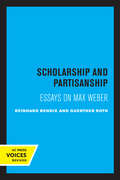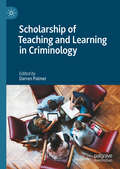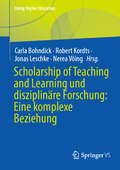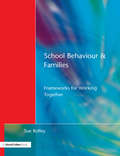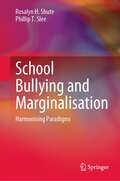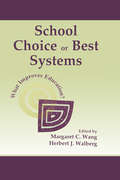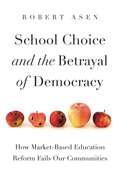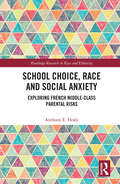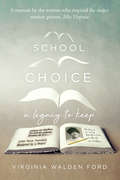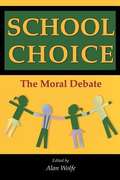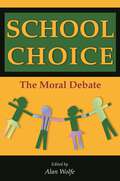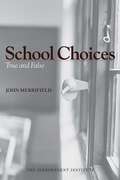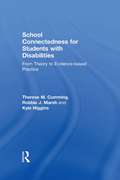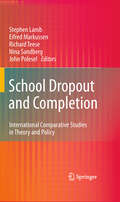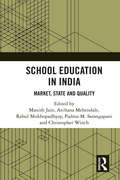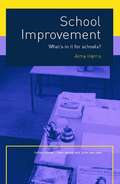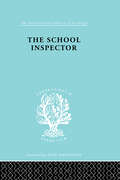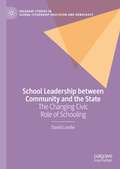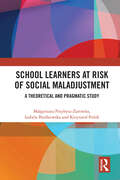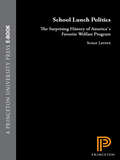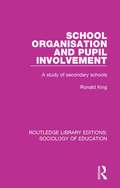- Table View
- List View
Scholarship and Partisanship: Essays on Max Weber
by Guenther Roth Reinhard BendixToday, Max Weber appears to many younger academic rebels as the patron sait of "value neutral" social science, yet he too engaged in a furious generational rebellion of his own, and in the end chose science as a vocation. These essays deal with Weber's substantive and methodological contribution and the relation of his life to his place in intellectual and political history. They examine the influences on Weber, as well as his similarities to and differences from Marx, Burckhardt, Nietzsche, Durkheim, and others. The authors also give attention to the ideological background of the modern attack upon the university, and to comparative study of values, authority, and legitimation. Bendix's Presidential Address to the 1970 meeting of the American Sociological Association is included. This title is part of UC Press's Voices Revived program, which commemorates University of California Press's mission to seek out and cultivate the brightest minds and give them voice, reach, and impact. Drawing on a backlist dating to 1893, Voices Revived makes high-quality, peer-reviewed scholarship accessible once again using print-on-demand technology. This title was originally published in 1971.
Scholarship of Teaching and Learning in Criminology
by Darren PalmerThis book is the first dedicated collection aimed at examining teaching and learning issues within criminology. This collection of essays identifies how criminological practices are being shaped by larger developments and changes within the field of scholarship on teaching and learning. Changes include an increased university focus on ‘good teaching’ rankings and the associated emphasis on the professional development of teaching staff in order to shape them. In the past decade government funding for teaching and learning awards, and the move to sector funding on the basis of ‘good teaching’ outcomes (student satisfaction, completion rates, etc.), have further fostered developments in teaching and learning practices and the associated scholarship. However, criminology lags behind in responding to these changes. Scholarship of Teaching and Learning in Criminology aims to fill this gap by examining teaching practices in the hope of fostering a new generation of publications dedicated to scholarship on teaching and learning within the field.
Scholarship of Teaching and Learning und disziplinäre Forschung: Eine komplexe Beziehung (Doing Higher Education)
by Nerea Vöing Carla Bohndick Jonas Leschke Robert KordtsIn der Nachfolge Boyers (1990) und anderer Autor:innen im englischsprachigen Raum hat sich Scholarship of Teaching and Learning (SoTL) auch im deutschsprachigen Raum nicht als fachspezifische Forschung (Boyer: Scholarship of Discovery), sondern als systematische Erkundung (inquiry) der zumeist eigenen Lehre und des studentischen Lernens durch Hochschullehrende entwickelt. Dabei sind die Abgrenzungen zwischen den beiden Konzepten Forschung und SoTL allerdings weder konzeptionell noch konkret geklärt. Es stellen sich Fragen wie: Ist SoTL Forschung und wenn ja, ab wann? Mit welchen Methoden und Ansätzen wird SoTL durchgeführt? Welche fachspezifischen, nicht sozialwissenschaftlichen, Methoden oder Ansätze für SoTL gibt es? Dieser Band exploriert diese und andere Fragen zum einen aus der Perspektive von Lehrenden, die selbst in SoTL aktiv sind, zum anderen aus einer allgemeineren bildungswissenschaftlichen und hochschuldidaktischen Perspektive.
School Behaviour and Families: Frameworks for Working Together
by Sue RoffeyThis book focuses on the relationship that schools have with parents and carers, especially in the early stages of behavioral difficulty. It aims to promote the best possible partnership with parents in what is often a sensitive and emotionally fraught situation. It contains an overview of the context and a general theoretical framework for home school interactions on behavior; research findings on factors which facilitate or inhibit effective partnerships, helping teachers understand why some parents/carers are reluctant to become involved or may appear aggressive and suggests ways in which schools might usefully respond; and chapters written by contributors with specific expertise in working with parents who have harmed their children, the carers of children in foster families and residential homes, mobile families (including travelers and asylum seekers), and families from diverse communities. The book is intended primarily for teachers and school managers at every phase of education, but will also be of interest to educational psychologists, home-school liaison officers, support staff, counselors, mentors, LEA officers and anyone working in parent partnership schemes.
School Bullying and Marginalisation: Harmonising Paradigms
by Phillip T. Slee Rosalyn H. ShuteThis book addresses, and seeks to harmonise, different paradigms for understanding school bullying. It sets out to examine two paradigms for conceptualising bullying, and the worldviews that underpin them. It uses a complex systems perspective to bring the two paradigms together in a holistic fashion. By doing so, it creates an integrated framework for conceptualising the many individual, relational and societal factors that are in dynamic interaction and play a part in promoting or reducing school bullying. This book draws upon a number of disciplines by way of background, including evolutionary, child development and social psychological theories of group behaviour and identity. It proposes that the human need for belonging is central to understanding bullying, and situates the topic within an understanding of gender and children’s human rights, bringing philosophical and moral perspectives to bear. It discusses practical ways forward, presents a systemic approach to bullying and application of complex adaptive systems methods to bullying research and evaluation. It serves as an introduction to such methods and suggests further creative ideas for policy, intervention practice, and teacher education about bullying.
School Choice Or Best Systems: What Improves Education?
by Herbert J. Walberg Margaret C. WangThis book addresses one of the most urgent questions in American society today, one that is currently in the spotlight and hotly debated on all sides: Who shall rule the schools--parents or educators? School Choice or Best Systems: What Improves Education? presents an overview of research and practical applications of innovative--even radical--school reforms being implemented across the United States. These fall along a continuum ranging from "parental choice" to "best systems." At the one extreme are schools of choice, which allow parents to choose and even govern schools for their children. These include charter schools, traditional private and parochial schools, schools that are privately governed but publicly funded through vouchers, and those that are funded by private scholarships provided by both corporations and wealthy individuals. At the other extreme are centralized state or district systems, based on reform initiatives and new systems of education that have been developed in response to views of citizens and legislators that schools can do much better. These schools, which specify uniform goals, policies, and programs for each school, are highly innovative systems based on research or representing advanced thinking about "what works," and have attracted wide interest. Important questions related to schools of choice and best systems are addressed: How can we choose among schools of choice and best systems? Among the various approaches within each of these alternatives? How can we understand their guiding principles and operational practices? What results do they produce? How can we evaluate their claims? In choosing among the alternatives, how should issues of student achievement, accountability, costs, feasibility, and equity be factored in? This volume brings together leading researchers and education leaders who have carried out the latest studies and advances in the field, providing a forum for them to set forth the arguments and evidence that will be most helpful in making choices for tomorrow's schools. It does not provide a single "right" answer--values and preferences differ across parents, schools, districts, and states. However, there are benefits for all from seeing the rigorous research, challenging thinking, and alternate points of view this volume presents.
School Choice and the Betrayal of Democracy: How Market-Based Education Reform Fails Our Communities (Rhetoric and Democratic Deliberation #26)
by Robert AsenEvidence shows that the increasing privatization of K–12 education siphons resources away from public schools, resulting in poorer learning conditions, underpaid teachers, and greater inequality. But, as Robert Asen reveals here, the damage that market-based education reform inflicts on society runs much deeper. At their core, these efforts are antidemocratic.Arguing that democratic communities and public education need one another, Asen examines the theory driving privatization, popularized in the neoliberalism of Milton and Rose Friedman, as well as the case for school choice promoted by former secretary of education Betsy DeVos and the controversial voucher program of former Wisconsin governor Scott Walker. What Asen finds is that a market-based approach holds not just a different view of distributing education but a different vision of society. When the values of the market—choice, competition, and self-interest—shape national education, that policy produces individuals, Asen contends, with no connections to community and no obligations to one another. The result is a society at odds with democracy.Probing and thought-provoking, School Choice and the Betrayal of Democracy features interviews with local, on-the-ground advocates for public education and offers a countering vision of democratic education—one oriented toward civic relationships, community, and equality. This book is essential reading for policymakers, advocates of public education, citizens, and researchers.
School Choice and the Betrayal of Democracy: How Market-Based Education Reform Fails Our Communities (Rhetoric and Democratic Deliberation)
by Robert AsenEvidence shows that the increasing privatization of K–12 education siphons resources away from public schools, resulting in poorer learning conditions, underpaid teachers, and greater inequality. But, as Robert Asen reveals here, the damage that market-based education reform inflicts on society runs much deeper. At their core, these efforts are antidemocratic.Arguing that democratic communities and public education need one another, Asen examines the theory driving privatization, popularized in the neoliberalism of Milton and Rose Friedman, as well as the case for school choice promoted by former secretary of education Betsy DeVos and the controversial voucher program of former Wisconsin governor Scott Walker. What Asen finds is that a market-based approach holds not just a different view of distributing education but a different vision of society. When the values of the market—choice, competition, and self-interest—shape national education, that policy produces individuals, Asen contends, with no connections to community and no obligations to one another. The result is a society at odds with democracy.Probing and thought-provoking, School Choice and the Betrayal of Democracy features interviews with local, on-the-ground advocates for public education and offers a countering vision of democratic education—one oriented toward civic relationships, community, and equality. This book is essential reading for policymakers, advocates of public education, citizens, and researchers.
School Choice, Race and Social Anxiety: Exploring French Middle-Class Parental Risks (Routledge Research in Race and Ethnicity)
by Anthony E. HealyBased on a carefully contextualized and critical study, this book tells how France’s dominant social and political ideology and prevailing cultural conventions abate the effects of race and anxiety within school choice, here focused on public-school middle-class parents living among immigrants in the diverse Paris suburbs. The study employs innovative techniques to tackle the presence of race, a difficult topic in France, and to address the impact of global risk from which social anxiety springs. Interviews for this book took place when a wave of deadly terrorism, mass migration of refugees, and the divisiveness of a presidential election made topics around the study poignant. It demonstrates how race operates in French education policy and practices by directing attention to how experienced and more qualified teachers move over their careers to less diverse schools, seen by teachers as having better students. The book explores how social anxiety created through global risk is culturally resisted within the French context by viewing this resistance theoretically through parental dispositions. It presents the racist perception in French school choice by revealing the education policies and parental choices that often segregate immigrants into schools with inexperienced and unqualified teachers. This book will be of interest to academics at upper-level undergraduate as well as graduate courses, policymakers, educators who are interested in inequality, sociology of education, transnational and critical perspectives on race, schooling, and school choice.
School Choice: A Legacy to Keep
by Virginia Walden FordOn a cold winter night in February of 1967, a large rock shattered a bedroom window in Virginia Walden Ford's home in Little Rock, Arkansas, landing in her baby sister's crib. Outside, members of the Ku Klux Klan burned a cross on her family's lawn. Faceless bigots were terrorizing Virginia, her parents, and her sisters–all because her father, Harry Fowler, dared to take a job as the assistant superintendent of personnel for the Little Rock School District. He was more than qualified, but he was black.In her searing new memoir, legendary school choice advocate Virginia Walden Ford recounts the lessons she learned as a child in the segregated south. She drew on those experiences—and the legacies handed to her by her parents and ancestors—thirty years later, when she built an army of parents to fight for school choice in our nation's capital. School Choice: A Legacy to Keep, tells the dramatic true story of how poor D.C. parents, with the support of unlikely allies, faced off against some of America's most prominent politicians—and won a better future for children.
School Choice: The Moral Debate
by Alan WolfeSchool choice has lately risen to the top of the list of potential solutions to America's educational problems, particularly for the poor and the most disadvantaged members of society. Indeed, in the last few years several states have held referendums on the use of vouchers in private and parochial schools, and more recently, the Supreme Court reviewed the constitutionality of a scholarship program that uses vouchers issued to parents. While there has been much debate over the empirical and methodological aspects of school choice policies, discussions related to the effects such policies may have on the nation's moral economy and civil society have been few and far between. School Choice, a collection of essays by leading philosophers, historians, legal scholars, and theologians, redresses this situation by addressing the moral and normative side of school choice. The twelve essays, commissioned for a conference on school choice that took place at Boston College in 2001, are organized into four sections that consider the relationship of school choice to equality, moral pluralism, institutional ecology, and constitutionality. Each section consists of three essays followed by a critical response. The contributors are Patrick McKinley Brennan, Charles L. Glenn, Amy Gutmann, David Hollenbach, S. J., Meira Levinson, Sanford Levinson, Stephen Macedo, John T. McGreevy, Martha Minow, Richard J. Mouw, Joseph O'Keefe, S. J., Michael J. Perry, Nancy L. Rosenblum, Rosemary C. Salomone, Joseph P. Viteritti, Paul J. Weithman, and Alan Wolfe.
School Choice: The Moral Debate
by Alan WolfeSchool choice has lately risen to the top of the list of potential solutions to America's educational problems, particularly for the poor and the most disadvantaged members of society. Indeed, in the last few years several states have held referendums on the use of vouchers in private and parochial schools, and more recently, the Supreme Court reviewed the constitutionality of a scholarship program that uses vouchers issued to parents. While there has been much debate over the empirical and methodological aspects of school choice policies, discussions related to the effects such policies may have on the nation's moral economy and civil society have been few and far between. School Choice, a collection of essays by leading philosophers, historians, legal scholars, and theologians, redresses this situation by addressing the moral and normative side of school choice. The twelve essays, commissioned for a conference on school choice that took place at Boston College in 2001, are organized into four sections that consider the relationship of school choice to equality, moral pluralism, institutional ecology, and constitutionality. Each section consists of three essays followed by a critical response. The contributors are Patrick McKinley Brennan, Charles L. Glenn, Amy Gutmann, David Hollenbach, S. J., Meira Levinson, Sanford Levinson, Stephen Macedo, John T. McGreevy, Martha Minow, Richard J. Mouw, Joseph O'Keefe, S. J., Michael J. Perry, Nancy L. Rosenblum, Rosemary C. Salomone, Joseph P. Viteritti, Paul J. Weithman, and Alan Wolfe.
School Choices: True and False
by John MerrifieldThe school choice movement has gained political momentum in recent years, with programs having been established in Milwaukee, Florida, Texas, and elsewhere. But today&’s programs are nothing like the "free market in education" proposed four decades ago by the early proponents of school choice.Economist John Merrifield shows that the "school choice" movement has become mired in false alternatives, petty distinctions, and diminished vision. Yet, he argues that programs providing real educational choices must not be allowed to fail like so many government programs—a freely competitive market for education must remain the ultimate goal. School Choices: True and False charts a course for the achievement of this goal.
School Connectedness for Students with Disabilities: From Theory to Evidence-based Practice
by Kyle Higgins Therese M. Cumming Robbie J. MarshSchool Connectedness for Students with Disabilities: From Theory to Evidence-based Practice focuses on the importance of school connectedness for students with disabilities, and presents ways in which this sense of connectedness can be fostered. Written from a holistic perspective, it embraces a variety of approaches, strategies and interventions rooted in evidence-based theory and practice, and examines them not only in regard to the student with a disability, but also school leaders, teachers, families and community members. The book describes and defines the concept of school connectedness, provides the reader with a theoretical framework from which to examine connectedness and explores connectedness from the lens of each of its components. It discusses the importance of assessing school connectedness in order to make data-based intervention decisions, as well as unpacking the components of student engagement, school climate, bonding and attachment. Several school-wide and leadership approaches that foster school connectedness are presented, as are ways to involve families. All of these are discussed through the lens of disability, in order to acknowledge the characteristics of disability that affect student levels of school connectedness.School connectedness has become a priority for many schools and educators internationally. Research demonstrates the importance of connectedness as a protective factor, and its impact on the health behaviour, social, emotional and academic outcomes of young people. Grounded in theory and relevant to practice, this is essential reading for anyone interested in improving the school connectedness of students with different disabilities across the lifespan.
School Dropout and Completion
by Stephen Lamb Richard Teese John Polesel Eifred Markussen Nina SandbergSchool dropout remains a persistent and critical issue in many school systems, so much so that it is sometimes referred to as a crisis. Populations across the globe have come to depend on success at school for establishing careers and gaining access to post-school qualifications. Yet large numbers of young people are excluded from the advantages that successful completion of school brings and as a result are subjected to consequences such as higher likelihood of unemployment, lower earnings, greater dependence on welfare and poorer physical health and well-being. Over recent decades, most western nations have stepped up their efforts to reduce drop out and raise school completion rates while maintaining high standards. How school systems have approached this, and how successful they are, varies. This book compares the various approaches by evaluating their impact on rates of dropout and completion. Case studies of national systems are used to highlight the different approaches including institutional arrangements and the various alternative secondary school programs and their outcomes. The evaluation is based on several key questions: What are the main approaches? How do they work? For whom do they work? And, how successful are they in promoting high rates of completion and equivalent outcomes for all? This book examines the nature of the dropout problem in advanced industrialized countries with the goal of developing a broader, international understanding that can feed into public policy to help improve completion rates worldwide.
School Education in India: Market, State and Quality
by Christopher Winch Manish Jain Archana Mehendale Rahul Mukhopadhyay Padma M. SarangapaniThis volume examines how the public and private domains in school education in India are informed and mediated by current market realities. It moves beyond the simplistic dichotomy of pro-state versus promarket factors that define most current debates in the formulations of educational reform agendas to underline how they need to be interpreted in the larger context. The chapters in the volume present a series of conceptual and empirical investigations to understand the growth of private schools in India; investigate the largely uncontested claims made by the private sector regarding provision of superior quality of education; and their ability to address the educational needs of the poor. Further, the book looks at how the private–public dichotomy has been extended to professional identity of teachers and teaching practices as well. <P><P>Rich in primary data and supported by detailed case studies, this volume will be of interest to teachers, scholars and researchers dealing with education, educational policy, school education and public policy. It will also interest policy makers, think tanks and civil society organisations.
School Experience: Explorations in the Sociology of Education (Routledge Library Editions: Sociology of Education #60)
by Martyn Hammersley Peter WoodsFirst published in 1977, this volume brings together a range of viewpoints, informed by reports of empirical research, which bear on the experience of school. Each chapter demonstrates the application of the ‘new sociology of education’ in its various guises to the world of teachers and pupils. In doing so, they exemplify the fields of investigation opened up by these theoretical developments, and also suggest directions ahead. The tensions in the articles reflect the tensions that existed in the sociology of education. By bringing them together, the aim of this volume is to contribute to a more soundly based sociology of education.
School Improvement: What's In It For Schools? (What's in it for schools?)
by Alma HarrisThis book aims to demystify the principles and practice of school improvement by demonstrating how successful classroom and school improvement occurs. It outlines the conditions, strategies and approaches that promote sustainable improvement and provides an overview of the main theoretical perspectives in this area. This accessible text will be useful for practitioners working within schools and with schools, offering clear guidance for those keen to raise standards and improve achievement. The What's In It For Schools? series aims to make educational policy issues relevant to practitioners. Each book in the series focuses on a major educational issue. The author sets the issue in context, looks at how it impacts on the daily lives of schools and teachers, and raises key questions. The books are grounded in sound theory, recent research evidence and best practice, and will make an excellent addition to any staffroom bookshelf.
School Inspector Ils 233 (International Library of Sociology)
by E.L. EdmondsFirst Published in 1998. Routledge is an imprint of Taylor & Francis, an informa company.
School Knowledge for the Masses: World Models and National Primary Curricular Categories in the Twentieth Century (Routledge Library Editions: Sociology of Education #36)
by John W. Meyer David Kamens Aaron BenavotFirst published in 1992, this book presents unique quantitative data on the content coverage of primary education in a large number of countries since 1920. It demonstrates that these curricular outlines tend to be surprisingly similar across very disparate countries, and suggests the world processes that produced this result. Specifically, the study shows that the contemporary primary curriculum dates from changes in the late nineteenth century; that there has been a general shift towards a ‘social studies’ subject; that instruction in mathematics and sciences has tended to expand; that there have been substantial increases in foreign language instruction (and changes in the languages taught); and that instruction in the arts and physical education come to the standard world education model much later than other subjects. This work will be of particular interest to those studying primary curriculum, international education and the sociology of education.
School Leadership and Administration: The Cultural Context (Reference Books in International Education)
by Allan Walker Clive DimmockThis text calls for a broader approach to comparative educational administration: one which uses culture as the principle means of analysis. The articles collected by Allan Walker and Clive Dimmock detail the educational practices and outcomes of other systems while taking into account the mediating influence of culture. In this way, these essays stress the specific aspects of the cultures studied, and map out common ground for the study of administrators' values, beliefs, and actions.
School Leadership between Community and the State: The Changing Civic Role of Schooling (Palgrave Studies in Global Citizenship Education and Democracy)
by David LundieThis book presents changes in UK and global educational governance in the context of a radical shift in the operating logics of politics and its interaction with education. Beginning from the colonial origins of political interest in education, the author traces a fundamental shift in the patterns of governance of schools in England in the opening decades of the 21st century. Operating through the logics of public choice economics involving both real markets and quasi-markets, policy reforms have increasingly framed school values, and the value of schooling, in line with a politically determined and nostalgic discourse of ‘British values’. This stands in contrast to a previous focus on ‘community cohesion’ which foregrounded school partnership with the parent community and wider society. Tracing the processes and mid-level actors mediating between government and school leaders, the author identifies processes of recontextualisation through which policy can be reinscribed and resisted.
School Learners at Risk of Social Maladjustment: A Theoretical and Pragmatic Study
by Małgorzata Przybysz-Zaremba Izabela Bieńkowska Krzysztof PolokThis book is a valuable didactic help (school teachers, guardians, and parents included) for those who wish to understand the specifics of education better and for students of pedagogical and psychological faculties who plan to work with young people in various educational institutions.This volume examines the problems and challenges of social maladjustment at school from a theoretical and practical perspective – it not only aims to present the latest scientific research on students at risk of social maladjustment (as well as those socially maladjusted) but also proposes strategies and methods of working with those a-ected by it. In nine chapters focusing on various aspects of social maladjustment in school, the authors use their professional and scientific experience to present practical tips and suggestions for teachers, therapists, and pedagogues suggesting preventive actions to counteract pathological phenomena in schools.This book will be useful for all those professionally involved in the fields of education, psychology, sociology, remote work, and/or studies on child and youth development. It could also be an invaluable companion to policy-makers and professionals from government and nongovernment organizations working towards inclusive education and social development. Additionally, it will serve as a compendium of guiding methods for problems encountered in professional work.
School Lunch Politics: The Surprising History of America's Favorite Welfare Program
by Susan LevineWhether kids love or hate the food served there, the American school lunchroom is the stage for one of the most popular yet flawed social welfare programs in our nation's history. School Lunch Politics covers this complex and fascinating part of American culture, from its origins in early twentieth-century nutrition science, through the establishment of the National School Lunch Program in 1946, to the transformation of school meals into a poverty program during the 1970s and 1980s. Susan Levine investigates the politics and culture of food; most specifically, who decides what American children should be eating, what policies develop from those decisions, and how these policies might be better implemented. Even now, the school lunch program remains problematic, a juggling act between modern beliefs about food, nutrition science, and public welfare. Levine points to the program menus' dependence on agricultural surplus commodities more than on children's nutritional needs, and she discusses the political policy barriers that have limited the number of children receiving meals and which children were served. But she also shows why the school lunch program has outlasted almost every other twentieth-century federal welfare initiative. In the midst of privatization, federal budget cuts, and suspect nutritional guidelines where even ketchup might be categorized as a vegetable, the program remains popular and feeds children who would otherwise go hungry. As politicians and the media talk about a national obesity epidemic, School Lunch Politics is a timely arrival to the food policy debates shaping American health, welfare, and equality.
School Organisation and Pupil Involvement: A study of secondary schools (Routledge Library Editions: Sociology of Education #31)
by Ronald KingFirst published in 1973, this book is based on research carried about by Ronald King on integral parts of school organisation, including the assembly, uniform, rewards and punishments, games and out-of-school activities, curriculum, prefectorial system and school councils, in a sample of seventy-two schools. It measures and explores the level of pupils’ involvement in the school, in terms in their evaluations and effective dispositions, in relation to pupil age, sex and social background. This book will be a valuable resource for those studying the sociology and history of education, as well as educational research and school organisation.
